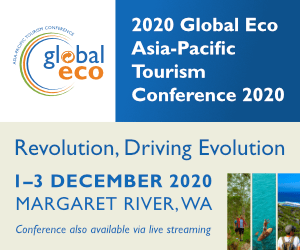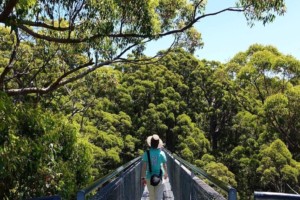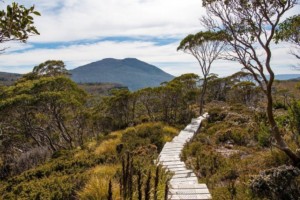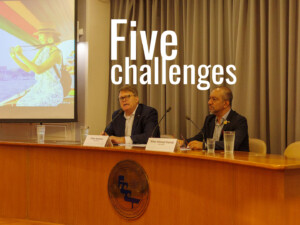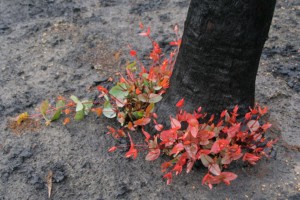‘Not good enough. Move your … !’ Grit, honesty, hope, and how to survive a crisis

Politicians and public servants spruiked their respective places and tax-payer-funded initiatives, and industry giants and global consultants had their say, but it was the small entrepreneurs who were the most inspiring speakers on the first day of the 2020 Global Eco Asia-Pacific Tourism Conference.
What matters?
Indeed Sonia Beckwith, co-owner of Live Ningaloo, had a message for the power brokers: “What you’re doing is great but may not be good enough.” And she urged fellow tour operators and the industry at large to keep going: “We’ll need you later.”
She insisted that everyone partner up to find creative solutions to crisis-induced problems. Find what matters, because it may not be what you’re focused on. Emphasise what matters, because that’s what will pull you through.
Ms Beckwith dedicated her speech to her father, a US military man, who taught her and her siblings the value of resilience and self-reliance. He made her face her fears; instilled in her the will to fight. This prepared her perfectly for the past year.
Live Ningaloo, which she co-founded with her partner, is the only small-group tour operator on Ningaloo Reef, Western Australia. “Small groups don’t fatigue staff,” she said, allowing guides the ability to make the “magic” happen by maximising the value of each tour for each guest.
Last year, 2019, was the first break-out season for the young organisation. They were prepared for a great 2020; preparing to scale up “just enough” to retain staff, pay off business loans, put a downpayment on a house, and take an off-season trip.
Then COVID hit. On March 18, the season opened. On March 23, only five days later, the season closed. Ms Beckwith choked up as she related having to lay off staff.
Reverting to survival mode inspired by childhood — her father on the sidelines, a spectator: “That’s not good enough. Move your ass!” — she set out to “resell the sold”.
Live Ningaloo couldn’t afford to refund 900+ deposits. That money was already spent to get through the off season, which is normal for a seasonal tourism business. But what value could Live Ningaloo offer to entice people to keep faith? Everybody needs cash in a crisis!
“We were honest,” she said. And they survived.
‘Not all ablaze’
Craig Wickham, managing director of Exceptional Kangaroo Island, also advocates honesty. Communication was critical in the aftermath of the summer 2019/20 Kangaroo Island bushfire; to make sure stakeholders — customers, staff, etc — knew exactly what was going on. Mr Wickham personally published 35 updates between December 20 and January 18. Collectively, the industry can be much better at disseminating accurate, timely information in relation to natural disasters, he reckons.
On Kangaroo Island, South Australia, more than 90 homes and numerous business premises went up in smoke. Mr Wickham saw cancellations worth AUD 420,000 (USD 310,000) in just 10 days. Yet he remained positive; glass half full. For example, while 42% of the island burned, that left 58% untouched! And while the fire impacted mainly in the west of the island, that meant the east was fine!
Exceptional Kangaroo Island reopened for business on January 14 with adjusted itineraries with direct substitutions of experiences; like for like. And they only used new time-stamped images in marketing and promotions so as not to deceive customers. Customers appreciated that.
Mr Wickham also undertook an arduous 16-city tour of the USA and Canada, January 26 to February 23, with the truthful message that Australia was a big place “not all ablaze”. Even in fire-affected areas there was now the attraction of an amazing regeneration and regrowth event in the Australian bush. And, anyway, there were plenty of places to go and things to do and wildlife to see that were unaffected by fire.
Then COVID.
Mr Wickham shared four points he thinks are critical to effective crisis communications and business survival during tough times. He recommends remaining:
- Visible — accessible, positive, innovative, empathetic
- Flexible — find ways and means to access new markets and generate revenue
- Engaged — stay in touch with partners and industry by any means
- Confident — project a positive attitude; always answer when opportunity knocks
Rising consciousness
Amy Carter-James, co-founder and CEO of Raaise, still reckons tourism can be a force for positive change in the world.
As a fresh graduate, Ms Carter-James and friends set out to create a tourism experience in Mozambique, where life-expectancy was 37. They established a lodge offering “experiential luxury” as opposed to material luxury; created a social enterprise from which 5% of the revenue went back to the community; generated sustainable enterprises and livelihoods; positively impacted 60,000+ lives; tripled school attendance almost immediately; delivered better health outcomes … It took some 14 years to have a 100% local workforce.
Then Cyclone Kenneth, in April 2019, 17 years after it all started. Kenneth took down everything; the hotel; the schools … Then a global pandemic… Now a local war; seven weeks ago insurgents took over the whole community …
Despite the crush of disasters and crises in a place she knows so well and loves so dearly, Ms Carter-James is generally “more hopeful today than ever” because of a rising consciousness among people. To leverage that, Raaise allows individual investors to align their investments with their values; and entrepreneurs to raise funds that give them the leeway to grow sustainably and responsibly.
Ecotourism Australia’s outcomes focus
Keynoting the event in her role as chair of Ecotourism Australia (EA), Dr Claire Ellis said her aim has been to make EA more than a certification organisation. EA is becoming more “outcomes-focussed” around new challenges, such as climate change, as well long-standing issues, such as engaging traditional landowners. Across a range of issues, travellers increasingly want to feel good about their trips, she asserted.
Tourism remains a powerful tool in regional development, Dr Ellis said. It’s an “old word” but ‘sustainability’ still has meaning; and the newer buzzword ‘regenerative’ is helping to “sharpen focus”. It’s time to “reset”, she said, to think about “better” when building back; to put communities “back on top”; to “influence up”.
At the start of the event, Tony Charters AM, co-convenor of the 2020 Global Eco Asia-Pacific Tourism Conference, said they were determined to run the event despite the difficulties of the year. They were forced to look at live-streaming, including setting up regional “nodes”, which have helped deliver the second-highest delegate count in Global Eco history. Prof Ross Dowling AM, Honorary Professor of Tourism, School of Business & Law at Edith Cowan University and co-convenor of the event, performed master of ceremony duties.
The 2020 Global Eco Asia-Pacific Tourism Conference is taking place December 1 – 3, 2020 in Margaret River, Western Australia.
Featured image (top of post): Sandpaper in different grits (40, 80, 150, 240, 600). By Simon Eugster (CC BY-SA 3.0) via Wikimedia. (“GT” cropped it.)


